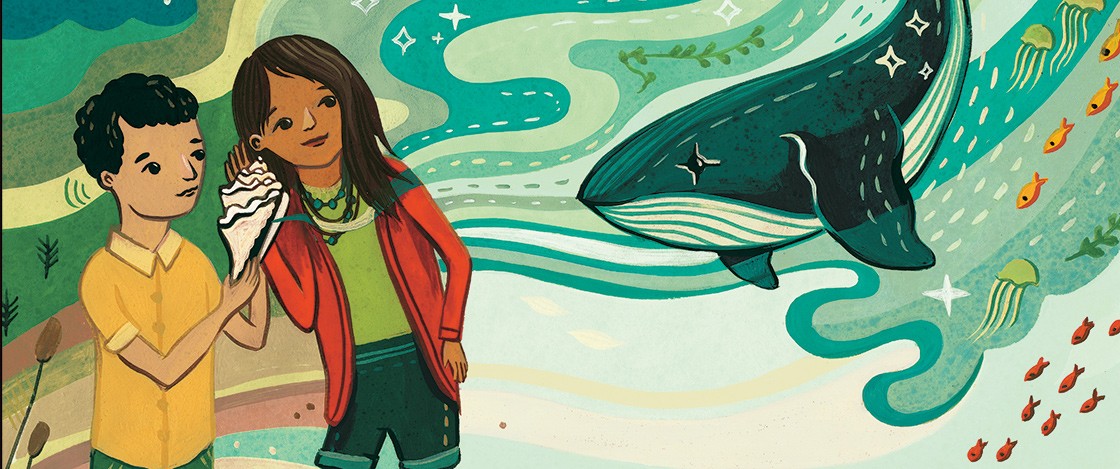
Carrying Our Words
Poet Ofelia Zepeda celebrates the power of the ocean’s sound.
Learning Objective: Students will explore what the ocean and the speakers in the poem offer each other with the sounds they make.
Standards
More About the Story
Skills
interpreting text, point of view, theme, key idea, poetry writing
Complexity Factors
Levels of Meaning
The poem offers the speakers’ account of traveling to the ocean and appreciating its power and the sound of its waves.
Structure
The poem is made of eight lines. It is told in the third person plural.
Language
The poem includes some higher-level words, such as thunderous and majestic, and compares the ocean to a relative.
Knowledge Demands
No special knowledge required.
1. Preparing to Read
- Call on volunteers to describe the sound of the ocean and how it makes them feel.
- Have a student read aloud the Up Close box. Preview the words thunderous and majestic.
2. Reading the Poem
Read the poem aloud for the class, or play our audio version. Then discuss the following questions.
Close-Reading and Critical-Thinking Questions (15 minutes, activity sheet online)
- Who do you think is speaking in the poem? (point of view)
At least two people are speaking; the poet uses the words we and our. Students might suggest the boy and girl in the picture are the speakers.
- What does the ocean sound like to the speakers? How does it make them feel? Explain using details from the poem. (interpreting text)
The ocean sounds loud and mighty. They say the waves are “thunderous” and mention the “ocean power.” The speakers feel in awe of the ocean. They say it is “majestic” and sing of “respect,” which shows they think it has greatness and beauty.
- What does the ocean give the speakers? What do they give to the ocean? (theme)
The ocean gives them sounds to appreciate; they say it “gifts us songs.” In turn, they offer the ocean their words admiring its strength; they “sing of our respect.”
- In the last line, why do you think they call the ocean their relative? (key idea)
Both they and the ocean are part of nature. They are related as parts of the earth.
- Why do you think the title of the poem is “Carrying Our Words”? (interpreting text)
The phrase is in the first line, and the poem is about offering words as a gift, the way you would carry a present and offer it to someone special.
At least two people are speaking; the poet uses the words we and our. Students might suggest the boy and girl in the picture are the speakers.
The ocean sounds loud and mighty. They say the waves are “thunderous” and mention the “ocean power.” The speakers feel in awe of the ocean. They say it is “majestic” and sing of “respect,” which shows they think it has greatness and beauty.
The ocean gives them sounds to appreciate; they say it “gifts us songs.” In turn, they offer the ocean their words admiring its strength; they “sing of our respect.”
Both they and the ocean are part of nature. They are related as parts of the earth.
The phrase is in the first line, and the poem is about offering words as a gift, the way you would carry a present and offer it to someone special.
3. Skill Building
Go online to get a poetry-writing activity based on “Carrying Our Words."
